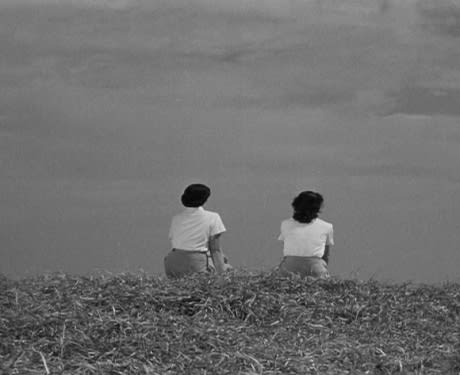With a careful, calculated pace and oft-motionless cinematography, more concerned with depth and framing than movement, Yosujiro Ozu's treatise on a rapidly changing Japan in the early 1950s, Early Summer, is a meditative experience unto itself. Each scene has a sense of deliberateness, both in composition and setup, simultaneously delivering a visceral and cerebral aspect for cineastes and aesthetes alike.
Thematically, this mostly didactic exercise tackles the changing role of women and the idea of family in—at the time—modern Japan. 28-year-old Noriko (Setsuko Hara) remains unmarried despite criticism from her traditionalist doctor brother Koichi (Chishu Ryu) and family-focused parents Shukichi (Ichirô Sugai). Koichi categorizes her defiance and unwillingness to accept an arranged marriage as an opportunistic reaction to the war, when men were off fighting leaving the women to enter the workforce and take on traditionally male roles.
While each character voices an opinion on the subject, either being confrontational or supportive, based primarily on their gender and age, Noriko struggles internally with the nature of acquiescence and independence, leading her to make a decision that suggests irreparable social change.
What's interesting about the works of Yasujiro Ozu is that they document the landscape of politics—both gender based and economic—throughout the '50s, acting as a time capsule in a modern context. Without being there, we, as an audience, can appreciate the hesitancy towards change and the anxiety, despite knowing that Westernization eventually saturated the Japanese landscape making marriage for love a non-issue.
It's also interesting to note the persistent perception of generational discord, with elders holding onto the past while children—here represented by Koichi's two spoiled boys—defy authority and throw temper tantrums, suggesting an overall fear for the future of the country. Like most admonitory works about the fear of change, Early Summer has a new dimension of intrigue decades later, teaching future generations not to panic at the prospect of broken tradition or change.
More directly, the naturalistic performances and subdued emotional component of Ozu's works were contrarily ahead of their time, introducing a non-theatrical style that would eventually be the quotidian for film globally.
Early Summer screens at the TIFF Bell Lightbox as part of the Japanese Divas retrospective at 6:15pm on March 8th, 2013.
(Shochiku)Thematically, this mostly didactic exercise tackles the changing role of women and the idea of family in—at the time—modern Japan. 28-year-old Noriko (Setsuko Hara) remains unmarried despite criticism from her traditionalist doctor brother Koichi (Chishu Ryu) and family-focused parents Shukichi (Ichirô Sugai). Koichi categorizes her defiance and unwillingness to accept an arranged marriage as an opportunistic reaction to the war, when men were off fighting leaving the women to enter the workforce and take on traditionally male roles.
While each character voices an opinion on the subject, either being confrontational or supportive, based primarily on their gender and age, Noriko struggles internally with the nature of acquiescence and independence, leading her to make a decision that suggests irreparable social change.
What's interesting about the works of Yasujiro Ozu is that they document the landscape of politics—both gender based and economic—throughout the '50s, acting as a time capsule in a modern context. Without being there, we, as an audience, can appreciate the hesitancy towards change and the anxiety, despite knowing that Westernization eventually saturated the Japanese landscape making marriage for love a non-issue.
It's also interesting to note the persistent perception of generational discord, with elders holding onto the past while children—here represented by Koichi's two spoiled boys—defy authority and throw temper tantrums, suggesting an overall fear for the future of the country. Like most admonitory works about the fear of change, Early Summer has a new dimension of intrigue decades later, teaching future generations not to panic at the prospect of broken tradition or change.
More directly, the naturalistic performances and subdued emotional component of Ozu's works were contrarily ahead of their time, introducing a non-theatrical style that would eventually be the quotidian for film globally.
Early Summer screens at the TIFF Bell Lightbox as part of the Japanese Divas retrospective at 6:15pm on March 8th, 2013.
